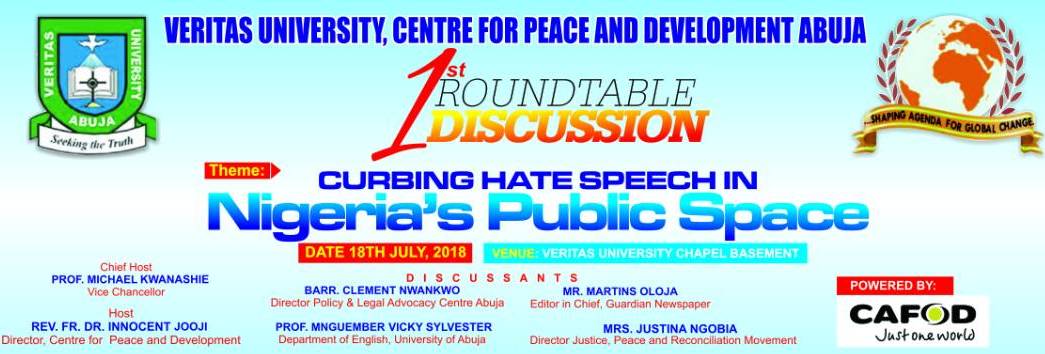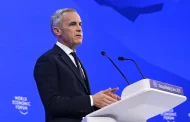There appears to be no let up in the Nigerian civil society’s siege on the phenomenon of hate speeches which peaked in a week long list of activities thereto last week in Abuja. Now, the siege is temporarily moving from the hands of the Kano based Centre for Information Technology and Development, (CITAD) which was behind much of the series of activities to the Centre for Peace and Development, (CEPAD), the research centre/think tank based at Veritas University, Abuja. CEPAD is making its entry with a Roundtable Wednesday July 18th, 2018 featuring a civil society activist, Clement Nwankwo, Martins Oloja of The Guardian, Professor Mnguember Vicky Sylvester, an academic from the Department of English at the University of Abuja and Mrs Justina Ngobia, Director of Justice, Peace and Reconciliation Movement. The speakers would be intervening in the debate from the angle of “Curbing Hate Speech in Nigeria’s Public Space” in the event scheduled to take place on the university campus at Bwari.
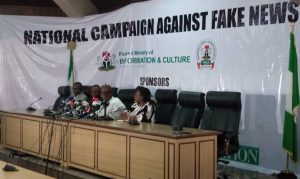 The past one week saw no less than two gatherings, each one interrogating one dimension of the hate speeches phenomenon or another. Then there was a ministerial appearance on “Combating Damages of Fake News in Nigeria” on Nigerian Television Authority, (NTA)’s ‘Good Morning Nigeria. Organised by CITAD with support from MacArthur Foundation, the media as the dominant channel for transmission of hate speeches was the focus of the July 10th workshop. In fact, “The Media and Hate Speeches” was the title of the workshop, with media unions presenting their positions. It was in this context that Mr. Waheed Odusile, the president of the Nigerian Union of Journalists, (NUJ) declared to all and sundry that “There Must Be a Country Called Nigeria Before You Can be Called Nigerian Journalists” as Intervention reported him in its coverage of the workshop. It was reading the riot act to bloggers in particular.
The past one week saw no less than two gatherings, each one interrogating one dimension of the hate speeches phenomenon or another. Then there was a ministerial appearance on “Combating Damages of Fake News in Nigeria” on Nigerian Television Authority, (NTA)’s ‘Good Morning Nigeria. Organised by CITAD with support from MacArthur Foundation, the media as the dominant channel for transmission of hate speeches was the focus of the July 10th workshop. In fact, “The Media and Hate Speeches” was the title of the workshop, with media unions presenting their positions. It was in this context that Mr. Waheed Odusile, the president of the Nigerian Union of Journalists, (NUJ) declared to all and sundry that “There Must Be a Country Called Nigeria Before You Can be Called Nigerian Journalists” as Intervention reported him in its coverage of the workshop. It was reading the riot act to bloggers in particular.
But, it wasn’t the NUJ president alone which was there. The Nigerian Guild of Editors, (NGE), Radio and Theatre Workers Union, (RATTAWU) and the Bloggers Association were all there. NGE Deputy-President, Suleiman Uba Gaya delivered a statement which a critic later said blamed everyone else but the Guild for the media’s role in hate speeches. A former editor pushed the criticism of the Guild to the farthest corner by asking if putting the pictures of violence in Somalia and Rwanda as pictures from Southern Kaduna is not an editorial decision.
These criticisms were reactions to the basic contention in the Guild’s presentation that the socio economic condition of the country is the explanation for media’s role in hate speech transmission. It is so bad that most media houses do not pay salaries anymore because the economy has virtually made it impossible for them to do so; there is none of the intervention funds by institutions such as the Central Bank of Nigeria, NEXIM for the media unlike other sectors of the economy; media institutions are forced to place more emphasis on commercialisation of news. Meanwhile, the cost of production keeps rising, newsprint rising from N140, 000 a tone to N450, 000 per tonne within one week, for instance.
Many editors take all sorts of directives from publishers and media owners in a situation in which they cannot do otherwise because they have to pay their bills at a time it is almost impossible to get another job. “In the last three years alone, about nine million jobs have been lost”, said Gaya who credited his figure to the National Bureau of Statistics, (NBS).
Nothing permits the journalist to engage in hate speech or spread hatred but the reality, in his view, is that the economic condition of the average journalist is pathetic today, the journalist being a human being. Not only is a youth dimension to the crisis: 72 percent of the population constituted by those born between 1983 but there is also an overwhelming percentage of them idle and up to a future full of uncertainties. They have not experienced what war means and they have not been sufficiently trained by the universities in terms of capacity for self-reproduction. So, the journalist doesn’t even know his country well enough to appreciate its diversities and take the many positives from its heterogeneity. Additional to all these is his point about the primacy of reliance on rumour and fake news due to lack of access to government officials and to information by journalists.
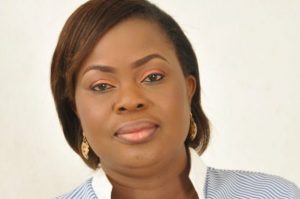
Funke Egbemode, President of the NGE
It was to this submission from Uba Gaya for the NGE that the above criticisms were directed. RATTAWU offered a less dismal situation report which talked about working with organised labour, the NUJ and other stakeholders on the issue. Already, it has put in place an election reporting committee and they are talking to their members in both the private and public stations on the need to curb hate speeches. The problem, according to Mr Kabir Garba Sanyi, its president, is that “most of these are being fuelled by politicians”.
Prince Chuks of the Bloggers Association took the floor to say that his members post whatever they see as capable of driving traffic. They resist being told what is fit to be circulated and, interestingly, the public prefers them even as many of them haven’t got anything beyond a handset.
His presentation generated interest from the floor. Someone said bloggers have no idea of hate speeches and many of them hardly leave their house even as their brand of journalism is not analytical as to say they do not necessarily need to be at an event to know what it is all about. Another one said that most of them are doing it for survival, informed by a kind of anarchic impulse which they are not even conscious of. The consensus is that their burning desire to break the news drives them, something that can, however, set the country on fire before anyone has time to find out where the fire is coming from.Apparently alarmed, the NUJ President said to bloggers, “If you set society on fire, you won’t know where the phone you are using is”. It appears the Nigerian society is now really coming face to face with the consequences of elite failure to conceptualise and operationalise a caring society. Instead, it wasted Nigeria’s oil resources in a drunken approach to development. Those whom that approach left behind appear to be mounting a revenge without appearing to even know that is what they are doing. If it is too costly to educate everyone, then try ignorance. That is where Nigeria appears headed.
Someone else said the tragedy is that no funders would give bloggers any money because they are not organised. “It would amount to throwing money in the air” came the voice from the floor. So also can they not be trained because they cannot send a representation anywhere, not being organised.
There was a devil’s advocate in the room. The academic said the discussion on Prince Chuks’ presentation was like asking bloggers to be what they did not set out to be. Bloggers are unskilled in a journalistic sense. Even the mainstream media was helped by the government to stabilise through the different phases of media restructuring in the country. He, therefore, asserts the need for regulation but not censorship of the social media. “We have to regulate it. We have to say that before you become a blogger, you must attend such and such a course”, the contributor said. The next voice disagreed completely, saying it is not fair to compel bloggers to become journalists.
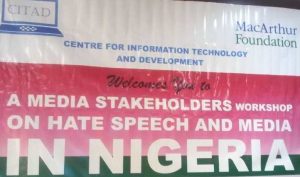 It was a remarkable lack of consensus in that the session was coming after an earlier clarification by Malam Y Z Y’au, CITAD’s Executive Director, that the social media is already the most transparent and most regulated space because everything anyone does in that space is monitored and captured by the platform managers. For him, the question by the participant as to whether it is the social media or citizen journalism that is the problem is what is crucial. It is not the social media per se because what goes on there is nothing more than the sort of conversation that goes on among family members. That is not what to monitor, he said. Hate speech on Facebook can be reported and it would most likely be removed by the platform managers. There can also be a counter-narrative to any provocative speech. The problem as far as he could see is that people are not reporting hate speeches on the social media.
It was a remarkable lack of consensus in that the session was coming after an earlier clarification by Malam Y Z Y’au, CITAD’s Executive Director, that the social media is already the most transparent and most regulated space because everything anyone does in that space is monitored and captured by the platform managers. For him, the question by the participant as to whether it is the social media or citizen journalism that is the problem is what is crucial. It is not the social media per se because what goes on there is nothing more than the sort of conversation that goes on among family members. That is not what to monitor, he said. Hate speech on Facebook can be reported and it would most likely be removed by the platform managers. There can also be a counter-narrative to any provocative speech. The problem as far as he could see is that people are not reporting hate speeches on the social media.
He cites the example of Facebook saying that Nigeria has the highest incidence of hate speeches on that platform but the least reporting of them. So, the problem, from his analysis, is that action is not being taken. His is a crucial clarification showing that social media platform managers do not have such an objectivist attitude to a highly contested concept as hate speech. And that is important for empowerment vis-a-vis the problem of cycle of violence. For, a hateful speech is a speech so categorised by a reader based on his or her subjective reading of the text in question. If a text can be a hate speech to one person but a love letter to another, then by what criteria and by whom might hate speeches be determined without the determination becoming structural violence? This is the big question posed by the phenomenon under discussion.
Intervention’s coverage of that workshop has to go to a third segment to cover the background presentations by three academics: Prof Umaru Pate of Bayero University, Kano; Prof Jibrin Ibrahim of the Centre for Democracy and Development and Dr Tunde Akanni of the Lagos State University, (LASU). That would conclude this series on the week of anti-hate speeches events in Nigeria.

